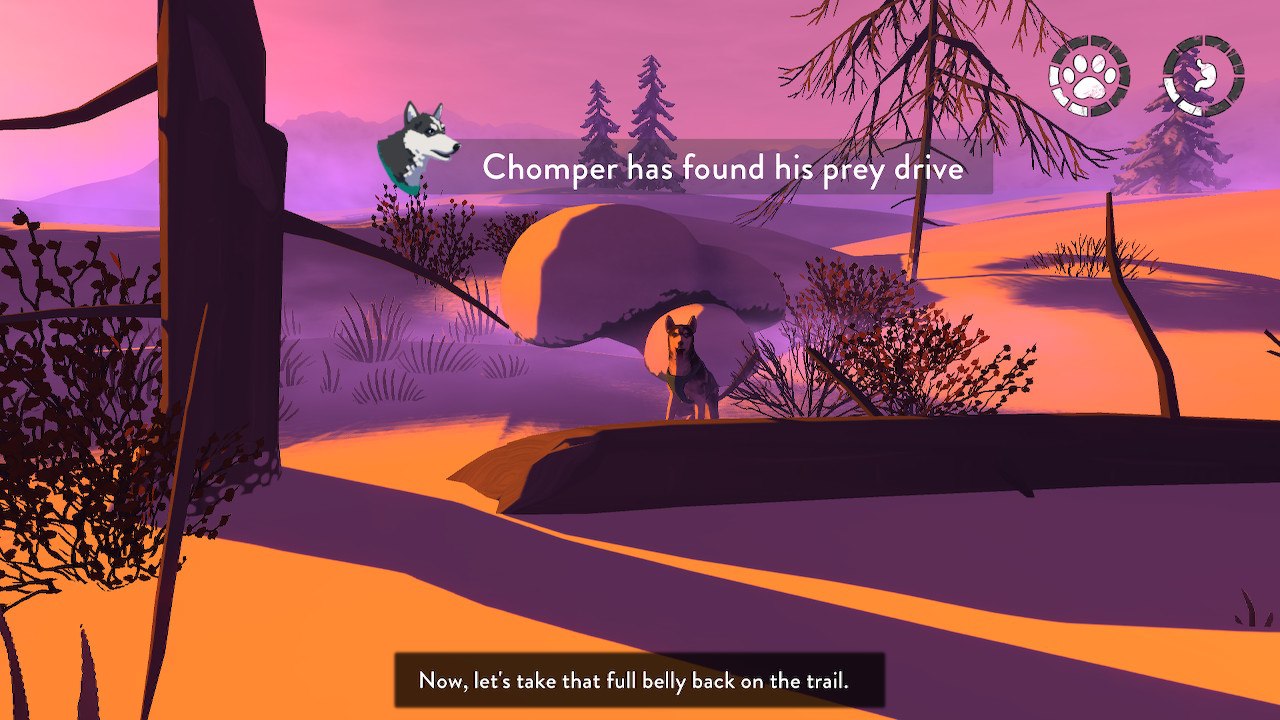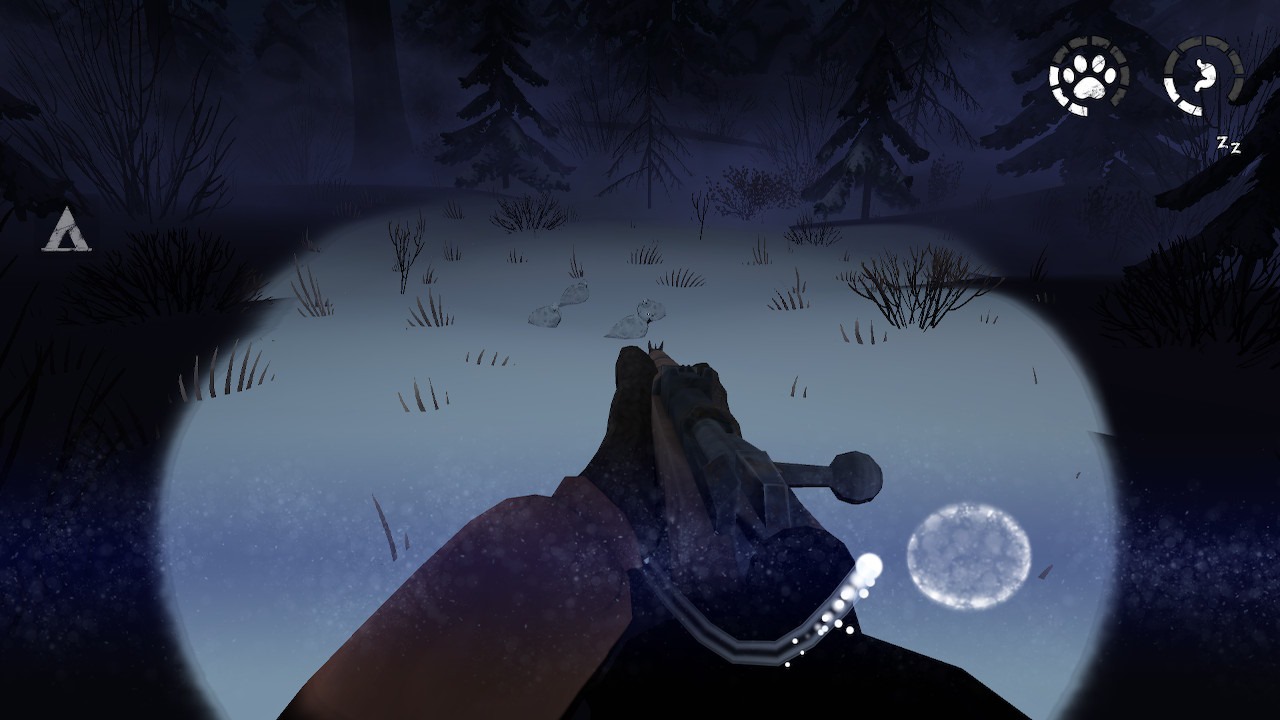Platforms:
PC, Nintendo Switch
Released:
October 23, 2020
Publisher:
Timberline Studio
Developer:
Timberline Studio
A few years ago my boyfriend was working a job that crushed him. It was temporary, it had an end date, but it was draining his soul and every day he dragged himself to work with mammoth effort. He told me some days he imagined a giant bird would swoop in through the window and take him away in its massive talons, or a wolf would spring on him and drag him into the bushes. Thankfully, he survived that concerning ordeal – but that feeling, that daydream of escaping, that longing to leave it all behind and experience something dangerous – isn’t that a feeling we’ve all had at some point?
For the musher, the player character in Timberline Studio’s The Red Lantern, that daydream is real. Leaving behind a life of disappointments and regrets, the musher has fled to Alaska with a sled, a van, and an adopted dog named Chomper. In this rogue-lite survival adventure your choices guide the musher and their party of pups across frozen lakes and snow-tipped forests towards the safety of a friend’s cabin: signified by the titular red lantern hanging by its door.
Get dogs? Tick. Get sled? Tick.
As a rogue-lite, progression in the story happens gradually with repeated attempts to reach the cabin. You begin by picking four dogs to adopt, each with their own distinct personality and quirks. Guided by a rough-drawn map, at each fork in the trail you decide which direction the dogs will drag the sled across the tundra. Along the way you’ll have various encounters with wildlife and environmental hazards, which present opportunities for gathering resources or bonding with your canine companions. Your dogs have limited energy, and the musher has a hunger meter, so you need to practice “living off the land” to keep your run going. This boils down to hunting (and fishing, once you find the fishing rod). At any point, you can choose to camp to consume food, get warm by the fire, tend to your pups, or sleep to prevent tiredness from setting in.

The sled dogs are the true stars of The Red Lantern. Barkley, for example, is fiercely protective, while Slayer is a bit of a timid boy. This comes into play throughout your journey, with each dog getting its own mini-narrative arc and pursuing specific interests. As somewhat of a connoisseur of gaming puppers, I knew right away that I was going to fall in love with every single one of these fluffy pals. Chomper loves chasing squirrels and I love giving Chomper chin-scrimtches. The developers were also kind enough to include a “dogs always live” setting in the menu which was a godsend for my fragile lockdown-weary nerves. That being said, seeing your dogs attacked by bears, moose, and wolves is still a terrifying and distressing experience not for the faint of heart.
The brutal Alaskan tundra of The Red Lantern
It’s incredibly jarring how harsh the gameplay experience of The Red Lantern is when compared to its aesthetic. Gentle music guides you across the gorgeously lit snowfields, then suddenly you run out of food, the musher’s eyes close, and the game unceremoniously announces “You starved” before launching you back to the prologue. Each run is explained as a kind of anxiety nightmare that warns the musher about something they need to prepare for, which is a good excuse to make the next run a bit easier – if you run out of food, for example, the musher remembers to pack a few extra bullets to increase hunting opportunities next time. It’s an interesting approach to progression, and any significant items such as the axe or the firestarter carry over permanently, as well as any discoveries you record in your journal. However, the harshness of the survival mechanics feel at odds with the game’s focus on exploration and discovery. You’ll often be given choices between fun interactions with animals or simply hunting them, and it’s so rarely practical to choose the fun option and risk dying as resources are so limited and every interaction costs at least one bar of the hunger meter. I found myself wishing for a god-mode so I could just experience the journey without, you know, dying all the time.
An absolute highlight of the game is its incredible voice acting. Featuring the immensely talented Ashly Burch (of Outer Worlds, Life Is Strange, and Horizon Zero Dawn renown) and accompanied by a gorgeous soundtrack from Hrishikesh Hirway, the story is beautifully narrated with precision and passion. Burch brings warmth and humour to the musher, with immense emotional depth and love for the dogs, while Hirway’s yearning piano score feels right at home in the stunning tundra.

Right at the beginning, The Red Lantern makes it very clear that this is a story about things not going to plan. One of your earliest encounters is with a beautifully majestic caribou. It stands right in front of you, and you have the option to shoot it or leave it alone. Of course, as a soft-boy vegetarian, I left it alone, and promptly starved to death within the next five minutes. You have to make tough decisions, and messing up any single decision will likely lead to the end of your current run. While the repetition of each run does make you learn about which encounters will be beneficial and which to avoid, the necessary “optimisation” kills the sense of discovery. After the fifth time being attacked by the same wolf I was dying for a speed-up button. I would also love to throw the hunting minigame right into the bin: it’s a sort of quicktime event where you wait for a bouncing ball to line up with a moving target, akin to waiting for the DVD logo to hit the corner of the screen. Since it’s randomised, it can take literal minutes to line up properly: excruciating and immersion-breaking. Fishing, thankfully, is much better, taking on a simplified version of the fishing game in Stardew Valley.
Despite receiving two patches in its first week of release, there are numerous performance issues and glitches in the Nintendo Switch version of The Red Lantern. The occasional voice clip is missing, initial loading times are very long, and a bug automatically mutes all sound volumes each time the game is launched. I had a run prematurely ended by a scene simply deciding not to load, and a glitch with the aforementioned hunting game starved my dogs right before reaching the cabin which was just infuriating. These kinds of issues will likely be patched at some point, but it’s worth noting that the game at release still needs work.
There are some incredible storytelling moments to be found in The Red Lantern. My favourite so far was seeing Barkley – who usually dives jaw-first onto any threat – use his words like a good boy and scare off a deadly moose by barking. I was such a proud dog dad, and I really felt that relationship had progressed throughout the run. However, these moments are few and far between long stretches of repetitive, often frustrating gameplay. The environments, narrative, and aesthetic are enchanting and calming, which is completely at odds with the stressful roguelike survival mechanics – it’s almost like two separate games playing tug-of-war. A patient gamer will find The Red Lantern’s narrative treats rewarding, while those with less tolerance for repetition may find themselves frustrated. It takes around four or five hours to complete (including the many deaths along the way), with further landmark and wildlife discoveries providing incentive for repeat playthroughs.
6
Decent
Positive:
- Excellent voice acting, full of tension and emotion
- Well-developed narrative moments
- Large lovable roster of unique dog friends
Negative:
- Survival mechanics discourage exploration
- Rogue-lite progression framework leads to frustrating repetition
- Several game-breaking glitches and performance issues
With some beautiful storytelling moments, lovable dogs and gorgeous aesthetics, there’s a lot to like about The Red Lantern. Unfortunately, its sense of discovery and freedom is let down by harsh survival mechanics and a rogue-lite system that emphasises repetition rather than exploration. Those with a desire for escapism and a healthy amount of patience will find a solid few hours of rewarding narrative here – if you’re after something with a bit more wanderlust and a bit less “dying alone and unloved”, you might want to look elsewhere.





